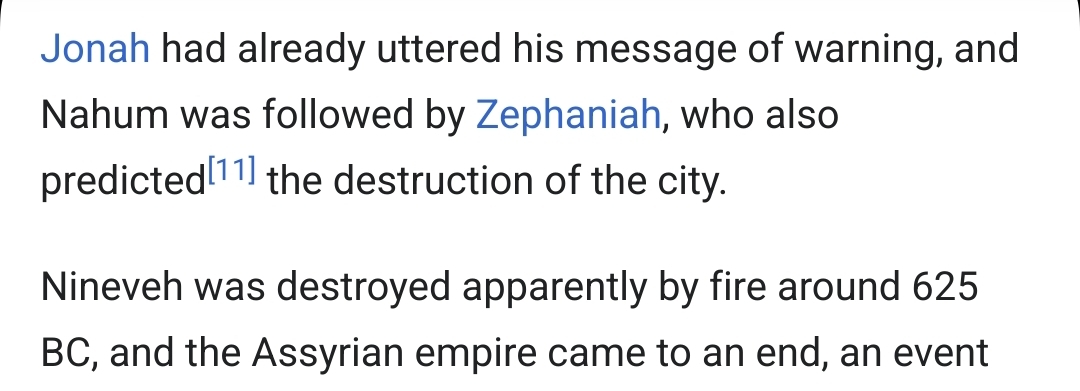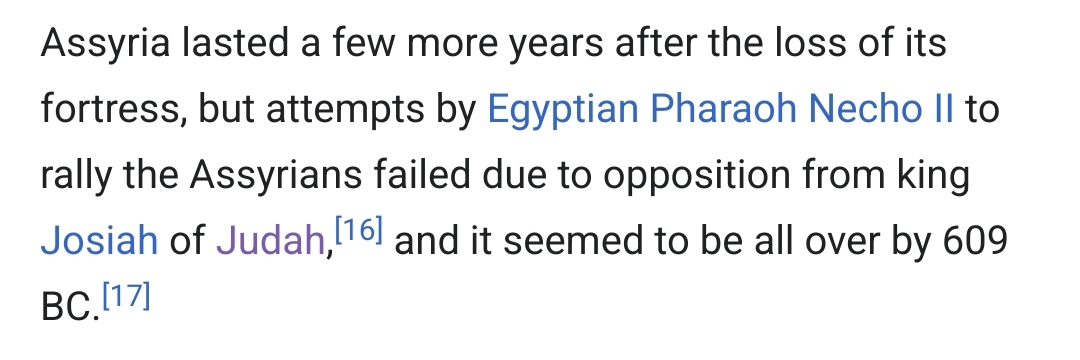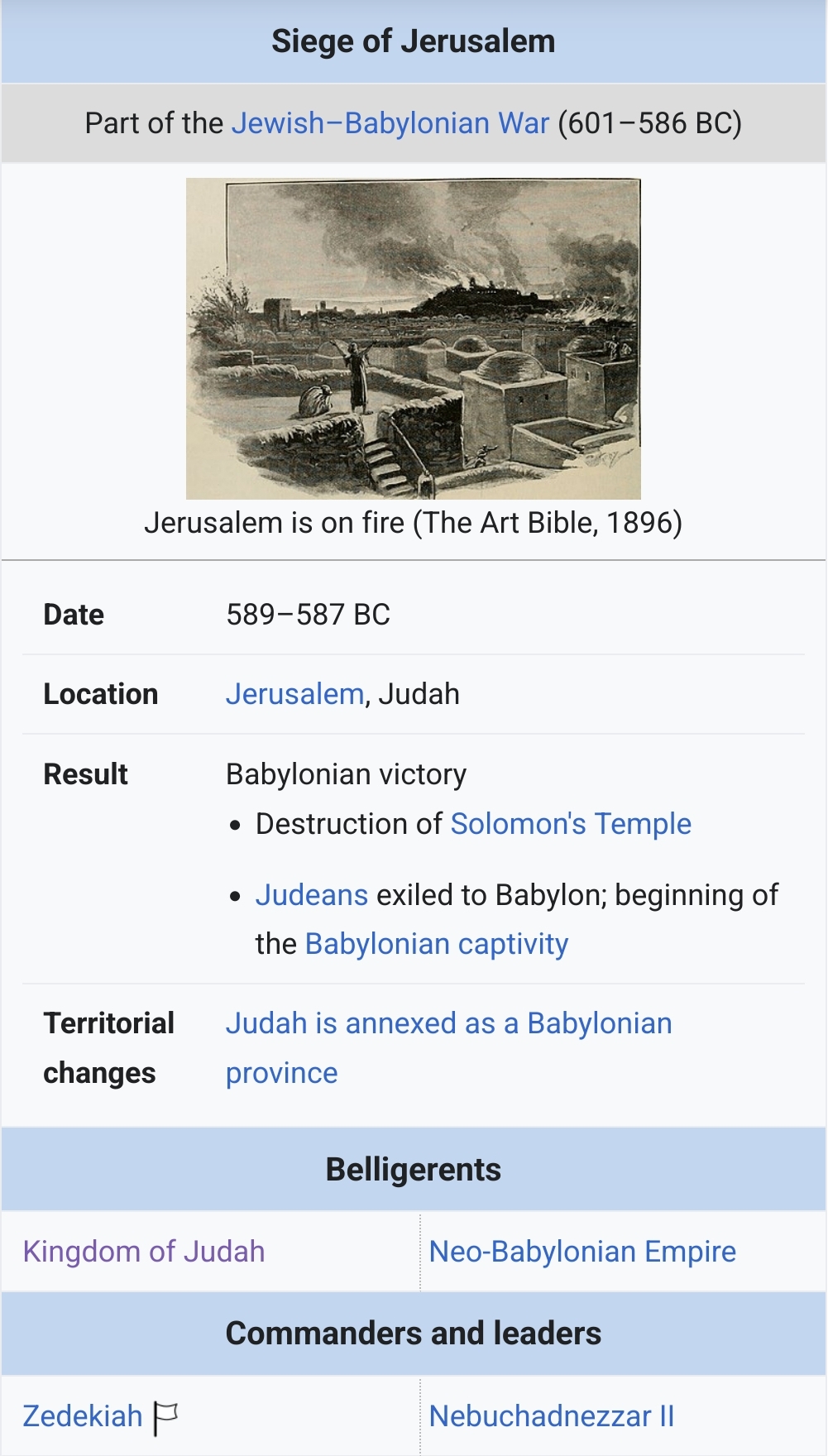Before Habbakuk came the book of Nahum, once again a short book of only three chapters :
Nahum 1:2-3 :
The Lord God demands loyalty. In his anger, he takes revenge on his enemies.
The Lord is powerful, yet patient ; he makes sure that the guilty are always punished.
He can be seen in storms and in whirlwinds ; clouds are the dust from his feet. [And other descriptions of God’s greatness]
Nahum 1:7-8
The Lord is good. He protects those who trust him in times of trouble.
But like a roaring flood, the Lord chases his enemies into dark places and destroys them. [And other threats against their enemies]
Nahum 1:11-15
Assyria, one of your rulers has made evil plans against the Lord.
But the Lord says, “Assyria, no matter how strong you are, you will be cut down ! My people Judah, I have troubled you before, but I won’t do it again. I’ll snap your chains and set you free from the Assyrians.”
Assyria, this is what else the Lord says to you : “Your name will be forgotten. I will destroy every idol in your temple, and I will send you to the grave, because you are worthless.”
Look toward the mountains, people of Judah ! Here comes a messenger with good news of peace. Celebrate your festivals. Keep your promises to God. Your evil enemies are destroyed and will never again invade your country.
[The next books(, of these last weeks,) were less hopeful, yet it wasn’t Assyria that destroyed Jerusalem, but Babylone, only a few decades after the fall of the Assyrian empire]




Yesterday we ended on John 5:18 :
Now the leaders wanted to kill Jesus for two reasons. First, he had broken the law of the Sabbath. But even worse, he had said God was his Father, which made him equal with God.
Here’s what follows, it’s a long speech so i’ll save the second half for tomorrow : John 5:19-30 :
Jesus told the people :
I tell you for certain the Son cannot do anything on his own.
He can do only what he sees the Father doing, and he does exactly what he sees the Father do.
[When it says that the Son can do only what he sees the Father doing, i think that the word/verb “sees” deserve our attention, the Son can’t do what s.he doesn’t see the Father doing, s.he searches for God as much as s.he can(, and act/do as perfectly/‘close to what s.he saw/perceived’ as possible).]
[Another interpretation linked to determinism wouldn’t hold b.t.w., while the childrens cannot do anything on their own, not all of them search, see/perceive, and do/act accordingly.]
[I understand these paragraphs as saying that we must be worthy children, and how to be/act as such(, by searching earnestly for God everytime)]
The Father loves the Son and has shown him everything he does. [Everything?]
The Father will show him even greater things [, so not everything], and you will be amazed.
Just as the Father raises the dead and gives life, so the Son gives life to anyone he wants to.
[Strong promise that wasn’t true(, except in the allegorical sense of reviving John the Baptist perhaps, or Jerusalem or others)]
The Father doesn’t judge anyone, but he has made his Son the judge of everyone.
The Father wants all people to honor the Son as much as they honor him. When anyone refuses to honor the Son, this is the same as refusing to honor the Father who sent him.
[…what( is the Son) ?]
I tell you for certain that everyone who hears my message and has faith in the one who sent me has eternal life and will never be condemned. They have already gone from death to life.
I tell you for certain the time will come, and it is already here, when all of the dead will hear the voice of the Son of God. And those who listen to it will live !
[Note that they/we were dead before hearing the message, i didn’t know this image, it explains a lot of other things with such definition, but it isn’t clear, it could still talk about the afterlife but it’s not clear either that it’s indeed what he meant. Most traductions add the word “already”, which would then imply that the first interpretation may be correct in some cases. If they went that far then it’s possible that the healings could have been allegorical as well, after all someone blind healed by the mouth of Jesus… i.d.k., we still say nowadays that someone is blind in an allegorical sense. Also, the first humans lived longer in the jewish tradition. And there’s possibly a link with a baptism with water as well.]
The Father has the power to give life, and he has given that same power to the Son.
And he has given his Son the right to judge everyone, because he is the Son of Man.
Don’t be surprised !
The time will come when all of the dead will hear the voice of the Son of Man, and they will come out of their graves.
[The greek version uses the word μνημείοις, not τάφος, perhaps with a double meaning in mind, but perhaps not]
Everyone who has done good things will rise to life, but everyone who has done evil things will rise and be condemned.
I cannot do anything on my own. The Father sent me, and he is the one who told me how to judge.
I judge with fairness, because I obey him, and I don’t just try to please myself.
[Do we seek to search//perceive//‘act according to’//obey God, to judge fairly, have we received the message and gained life, are we able to give life to others and be(come) worthy children ?]
Surah 2:88-91 :
And they say, “Our hearts ‘are wrapped’/‘do not hear/understand God’s Word’.”
Nay, God has cursed them for their disbelief, so little is that which they believe.
And when there came to them(, the jews ~‘and christians’), a Book(, this Qur’ân,) from God confirming what is with them(, the Torah and the Gospel), although aforetime they had invoked God in order to gain victory over those who disbelieved, then when there came to them that which they had recognised, they disbelieved in it. So let the Curse of God be on the disbelievers.
How bad is that for which they have sold their ownselves, that they should disbelieve in that which God has revealed(, this Qur’ân), grudging that God should reveal of His Grace unto whom He wills of His slaves.
So they have drawn on themselves wrath upon wrath. And for the disbelievers, there is disgracing torment.
And when it is said to them(, the jews ~‘and the christians’), “Believe in what God has sent down,” they say, “We believe in what was sent down to us.”
And they disbelieve in that which came after it, while it is the truth confirming what is with them.
[Speaks about Moses afterwards]
Saints of the day :
St. Evaristus, Pope
St. Frumentius, Bishop, Apostle of Ethiopia

